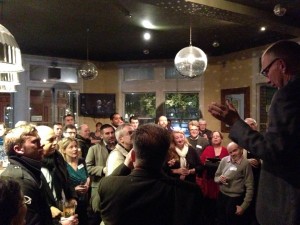For years now, Mick Hartley’s blog has often linked to and summarized journalism that covers the horror and absurdity of life under the North Korean regime. Not only are its subjects prisoners, but the story of their suffering is hidden from the outside world, both by the paranoia and secrecy of the country’s rulers and by the indifference of many outside the country.
A post on Hartley’s blog this week includes a depressing reminder of what can happen outside the prison walls when tyrants take care to kill their victims discreetly: nothing much:
After speaking recently to a group of young South Korean soldiers about North Korea’s harsh labor camps, former prisoner Jung Gyoung Il—himself once a soldier in North Korea’s massive army—was stunned by the questions from the audience.
One soldier asked how many days of leave North Korean soldiers were given. Another asked if North Korean soldiers were allowed to visit their girlfriends.
No one showed any curiosity about the notorious network of gulags, a signature marker of the North’s brutality toward its own people.
In a rare acknowledgment, the South Korean government recently noted in a report that hundreds of thousands of North Koreans are languishing in the prison camps. But Seoul has made no public effort to exert pressure on Kim Jong Il’s regime over the issue. And many South Koreans, who hold deeply conflicted feelings toward their communist neighbor, are reluctant to even concede that the camps exist.
At universities, Jung said, many students sleep through his lectures about North Korea’s gulags. The indifference still shocks him, five years after he defected to South Korea following three long years in the Yodok gulag characterized by back-breaking labor, a sparse diet and long nights of forced study of former dictator Kim Il Sung’s philosophies.
But such apathy is typical in South Korea, where North Korea’s prison camps have rarely been discussed in public or in the political arena.
“South Koreans say, ‘So what? What’s the big deal about it?'” said Kang Cheol-hwan, a former gulag inmate who wrote about his 10-year imprisonment in ´The Aquariums of Pyongyang: Ten Years in the North Korean Gulag.”
“What’s more surprising for me,” added Kang, now the director of the North Korea Strategy Center, a human rights advocacy group, “was that South Koreans did not believe gulags ever existed in North Korea. They thought it was a lie.”

Communities, majorities, lobbies, and “The Taxpayers’ Alliance”
A blog hosted on The Economist site, of all places, questions the name of a particularly noisy Right-wing UK special interest group—and counterparts in the US: